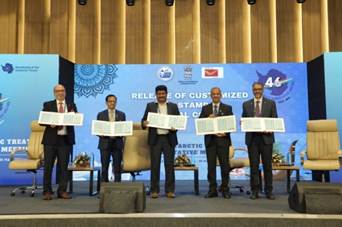Kochi: India has successfully concluded the 46th Antarctic Treaty Consultative Meeting (ATCM-46) and the 26th Committee on Environmental Protection (CEP-26), which took place from May 20th to May 30th, 2024, in Kochi, Kerala. The prestigious event, organized by the Ministry of Earth Sciences through the National Centre for Polar and Ocean Research (NCPOR), witnessed significant international participation and discussions on the future of Antarctica.
Union Minister for Earth Sciences and Food Processing Industries, Kiren Rijiju, announced India’s plan to establish a new Antarctic research station, Maitri-II, marking a significant step in the country’s polar research endeavors. The announcement was made during the ATCM-46, which was inaugurated by Rijiju, Ambassador Pavan Kapoor, Secretary (West) of the Ministry of External Affairs, and Dr. Shailesh Nayak, former Secretary of the Ministry of Earth Sciences and Director of the National Institute of Advanced Studies, Bengaluru. Ambassador Pankaj Saran, former Deputy Adviser to the National Security Board, chaired the 46th ATCM, while Dr. Vijay Kumar, Scientist G-Adviser, Ministry of Earth Sciences, headed the Host Country Secretariat.
The theme for ATCM-46 was “Vasudhaiva Kutumbakam,” a Sanskrit phrase meaning “One Earth, One Family, One Future,” reflecting the Antarctic Treaty System’s principles of peace, scientific cooperation, and preservation of Antarctica for humanity. The event underscored India’s commitment to safeguarding Antarctica’s unique ecosystems and promoting global environmental sustainability.
Dr. M. Ravichandran, Secretary of the Ministry of Earth Sciences and Head of the Indian delegation, highlighted India’s plans to submit comprehensive environmental evaluations for establishing Maitri-II. “The successful hosting of the 46th ATCM and 26th CEP in India underscores our collective resolve to safeguard Antarctica’s unique ecosystems and promote global environmental sustainability,” he said.
The ATCM and CEP are vital forums for Antarctic affairs, convened annually to facilitate dialogue and action towards preserving one of Earth’s most pristine ecosystems. This year’s discussions included the reaffirmation of the Antarctic Treaty (1959) and the Madrid Protocol (1991). An additional working group focused on developing a tourism framework for Antarctica.
The CEP-26, held from May 20 to 24, 2024, addressed various environmental issues, prioritizing the management implications of sea ice change, enhancing environmental impact assessments, protecting the emperor penguin, and developing an international framework for environmental monitoring. The Committee also adopted 17 revised and new management plans for Antarctic Specially Protected Areas (ASPAs) and encouraged the use of renewable energy and robust biosecurity measures.
NCPOR organized several side events to mark the ATCM-46 and CEP-26, including a seminar on “Changing Antarctic and Challenges Ahead” in collaboration with the Korean Polar Research Institute and Polar Cooperation Research Centre, Kobe University. Other outreach efforts included a mural unveiling themed “Species-rich Antarctica” by school children and a panel discussion for college students on “Antarctic Synergy: Driving Scientific Progress through Diplomacy, Fostering Cooperation through Research.”
The meetings brought together over 400 delegates from 56 countries, including diplomats, scientists, and experts, to discuss a wide range of Antarctic matters such as science, policy, governance, logistics, operations, and environmental stewardship. The event was conducted in person with a virtual audience, ensuring broad participation and engagement.
Dr. Thamban Meloth, Director of NCPOR, congratulated his team for successfully hosting the high-level meetings, stating, “Our active and strategic participation in Antarctic affairs, India’s polar program, and its role as host showcased our dedication to fostering global partnerships and advancing the cause of environmental conservation on a global stage.”





